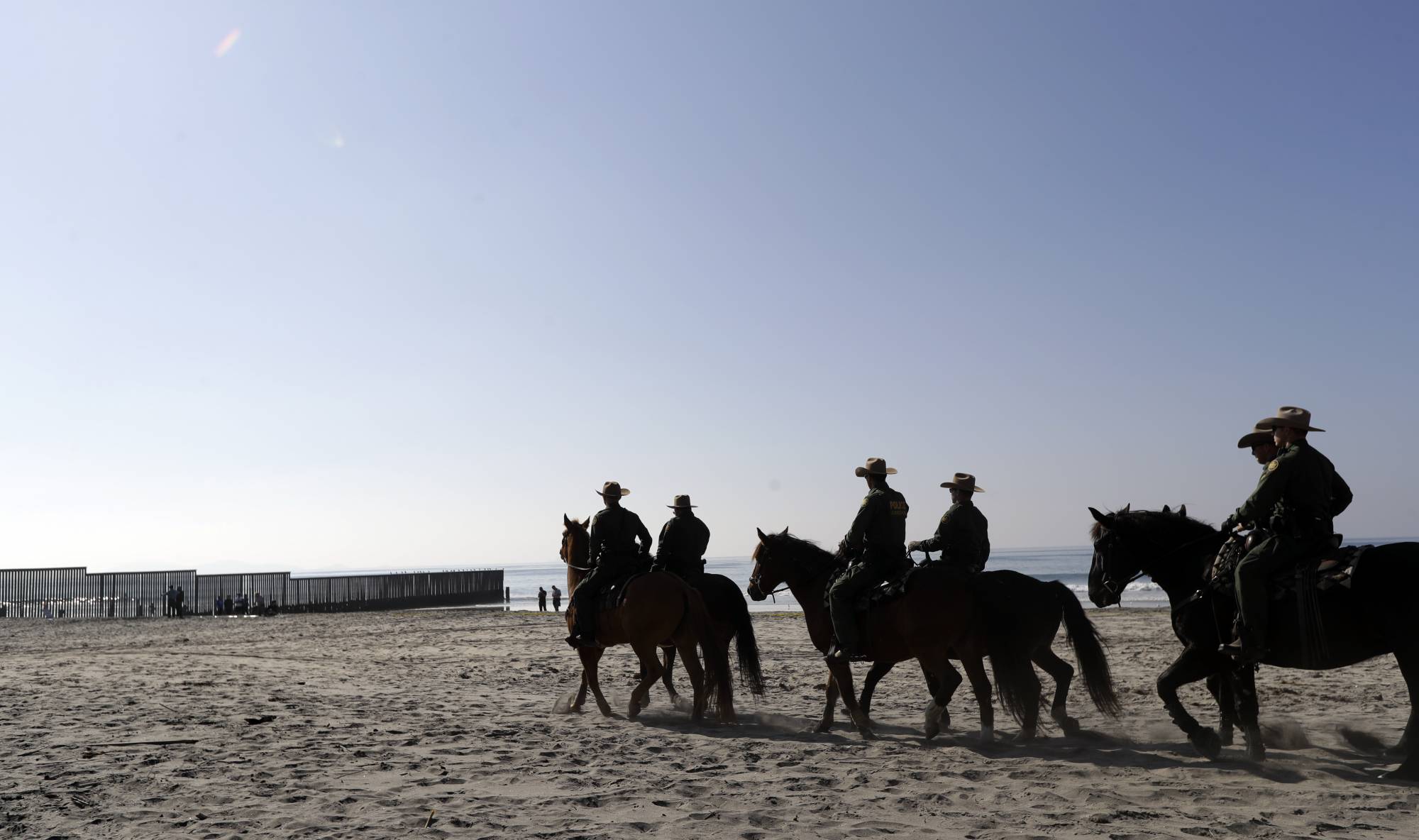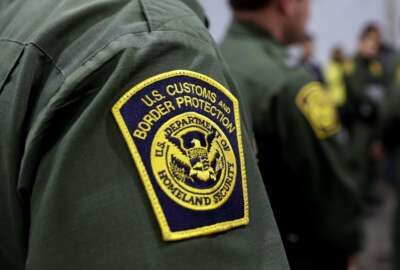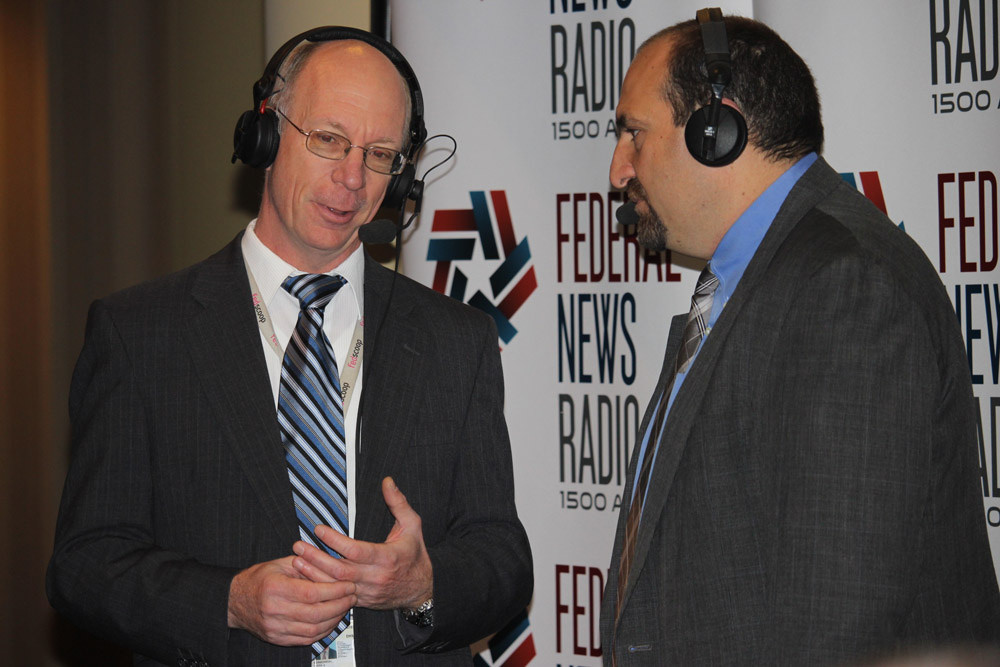
Customs and Border Protection has a new job position designed to smooth ruffled feathers
U.S. Customs and Border Protection sometimes faces distrust, even antagonism, among citizens and non-citizens officers encounter. To help ease this problem, CBP...
Best listening experience is on Chrome, Firefox or Safari. Subscribe to Federal Drive’s daily audio interviews on Apple Podcasts or PodcastOne.
US Customs and Border Protection (CBP) sometimes faces distrust even antagonism among citizens and non citizens that their officers encounter. To help ease this problem, CBP created a new position called senior community relations manager. The person taking that job is Nawar Shora. He joins The Federal Drive with Tom Temin.
Tom Temin And you know, reading just the general headlines in the general news, you would think it’s Immigrations and Customs Enforcement that has the tough job here dealing with the public and with other law enforcement, local communities? How does US Customs and Border Protection fall into that category, since most people think of them as just people you got to get your liquor by at the airport?
Nawar Shora That’s a fair question. I believe there are a lot of people who don’t quite understand the distinction between the varied components within the Department of Homeland Security (DHS). So we are all part of DHS. CBP, Immigration and Customs Enforcement (ICE), Transportation Security Administration (TSA), Coast Guard, we’re all part of DHS. And the role ICE plays that people are usually very visible to is the kind of detention and removal of people outside of the country. TSA gets thrown in because TSA, of course is at the airports or leaving the country. CBP roles is at the airports only at the ports of entry when people are coming, in flying in or crossing a land bridge from Canada or Mexico. And within that world of CBP, the two large components are Office and Field Operations, the blue uniforms that you see at airports, and Border Patrol the green uniforms. So the blue uniforms are at the ports of entry. The green uniforms are anywhere between the border, between the ports of entry. So that’s the actual border. You referencing bringing our liquor through or agriculture, that’s part of it. Absolutely. But it’s also a number of other factors, of course, that the officers and agents are checking.
Tom Temin And any particular incident or set of incidents, or maybe some particular hotspot in the United States, spark creating this position of community relations manager.
Nawar Shora Everything’s always connected. My understanding is varied leadership was meeting with constituents, particularly in the northern border. We often focus on the southern border. And there was a push, namely from the so called post-9/11 communities, to have a almost not so much a one stop shop, but one primary contact to help serve as a point person for outreach, stakeholder engagement, but also training and better informing our officers and agents. And just by luck that dovetails with my two decade career.
Tom Temin Yeah. Tell us about yourself. How did you come to this particular job?
Nawar Shora Certainly, certainly. The short short version is I was born in Syria 45 years ago, and grew up in a small town in West Virginia, and graduated law school in 2001. As you can imagine, you know, everything that happened in the fall of 2001, 9/11 of course, priorities changed, and I spent the first decade after 9/11, serving as a civil rights advocate, civil rights attorney. During that time, I did a lot of work with the varied three letter agencies and state and local law enforcement on what I call cultural demystification to better understand the post-9/11 groups. My simple formula has been in existence since then, communication plus understanding equals trust. And I’ve tried to take that with me, everywhere I go professionally. After about a decade in the civil rights sector, I joined the federal government at TSA, actually, first in the civil rights realm, then in the national security realm. And so what I’m proud of is that my two decade career is at the intersection of civil rights and national security. And the overlap there is greater than it appears actually.
Tom Temin Interesting. We’re speaking with Nawar Shora. He’s the senior community relations manager at US Customs and Border Protection. And so what’s your main task now? Who do you have to deal with? What measures do you expect to be taking? And you probably have to promote this throughout a very far flung organization. You personally can’t be everywhere all at once.
Nawar Shora Correct. I am based out of CBP headquarters in Washington, DC. I come out of the commissioner’s office. And that allows me to have a certain level of autonomy across the country, with again, a focus on the northern border. But obviously, wherever there may arise an issue I’ll pursue that. My charge is pretty simple. My charge is twofold. On the external front, it is to expand and enhance community outreach, where needed. Kind of a community policing approach to CBP. It doesn’t mean things are bad. It doesn’t mean things are broken. It just means that there’s always room for improvement. I partner up with everybody from the directors of field operations, the top senior executive servicers (SESers) in the field, to chief of staff, to chiefs, to actual supervisors at the ports of entry. Whomever I need to work with, I’m happy to and able to work with. On the internal front, assessing our skills and abilities as officers and agents — I’m not an officer or an agent. I’m an attorney — but our officers and agents and assisting them with enhanced training where needed, particularly this cultural demystification training that I’ve done now for for a while. And it’s stuff that we can always stand to do. It’s stuff that in their usual normal training isn’t always part of it. Right? When they’re at FLETC, the Federal Law Enforcement Training Center, they’re bombarded with all sorts of different skill sets and responsibilities to learn the culture, and the history, and the geography, and the norms and mores are often something that they have to learn on the job. And so this is where a lot of the work I’ll be doing more of within the agency.
Tom Temin So for example, cultural demystification, I guess, early after 9/11, maybe people just to put it crudely thought anyone leaving a mosque must be a terrorist. And so what you need to do then is make people understand that no, that’s not how it is not 99.99%. That type of thing would be under cultural demystification?
Nawar Shora Yes. So that would be part of it. And again, I’ve done this enough for over two decades. I’ve seen tens of thousands of audience members in my seminars, be they local and state or federal law enforcement, be they college professors and Dean’s, be they churchgoers and so forth. There’s a hunger to learn because there’s a vacuum. We don’t know so much about these communities still, you know, 21 years after 9/11, there’s still a lot of mystery. And yes, we’ll explain, we’ll demystify Islam. What is Islam? A lot of people don’t realize, of course, how similar Islam is to Judaism and Christianity. It’s part of the Abrahamic tradition. We cover linguistic terms. What is Allah? Right. Allah is a linguistic term, that means God. It is not the Muslim God. It is the same Judeo-Christian God, whether you say Yahweh, or God or Allah, so little things like that. But for officers and agents, we also will explain things like, you know, appearance, for example. Let’s say for local police, we’re training them on just appearance. I tell them, you get a call on your cruiser be on the lookout for a Middle Eastern looking male crossing the Safeway parking lot. Who are you looking for? And I look with that stereotype, right? And they answer certain way, most people will answer a certain way. And they’re looking for olive to dark complexion, dark hair, you know, scruffy beard, maybe traditional garb. But then that can be accurate, but that’s not necessarily capturing the entire image. And I use a lot of analogy in my seminars. And so you say, a Latino, and an image may pop into your head of what a Latino should look like, right? And maybe it’s me, I get Puerto Rican a lot. But if we go on the spectrum, right? If we go on the spectrum of color — and I hesitate to do it this way, but we often think in that way — Latinos go across the spectrum. You’ve got very fair skinned white Latinos all the way to very dark skinned black Latinos, brown, olive, you name it, right. Same goes for the Middle East. Same goes for the Arab world. So to help kind of literally demystify, so much for the audience members is essential. Again, behavior, history, geography, religion, all these little things, and it’s done in a light hearted way. I’ve had people say you take a very intimidating topic and you disarm it with humor. And that’s by design. I think we learn and retain more if we’re having fun. And if I’ve got you laughing, then I know you’re paying attention to me. So that was the second part of my charge is the internal enhanced training where needed.
Tom Temin Come to think of it as someone who is Jewish from Eastern European descent, I’ve been taken for Italian all my life. So I guess it crosses any way, you can look at it.
Nawar Shora Sure.
Tom Temin And do you have measurables? Is there a way that the program that you’re embarking on, is there a way of measuring outcomes of it?
Nawar Shora Yes and no. When I was doing national security work, how do you prove that we prevented a bad actor from committing something, right? The absence of a negative, is that a positive? The metrics there are harder and so with this position, yes, the positives will be things like literally feedback from the communities we serve, saying, “Thank you, we feel there’s more transparency with your feedback, quicker responses, less problems.” You know, one thing we’ve heard time and again from across the agencies, not necessarily only CBP, is rude and unprofessional behavior, right? If we can just have our people do a better job where needed, if needed, in welcoming people back home, right and not having a bad day and with reality that people have bad days but how to deal with it and in that respect. A lot of it will be the feedback from the communities as to the impact we are having. I’ve been on the job now for about two months and pleased to see that so far the feedback is positive.
Tom Temin All right. Sounds like important work. We’re glad you’re on the job. Nawar Shora is the senior community relations manager at the US Customs and Border Protection. Thanks so much for joining me.
Nawar Shora Thank you, sir.
Copyright © 2024 Federal News Network. All rights reserved. This website is not intended for users located within the European Economic Area.
Tom Temin is host of the Federal Drive and has been providing insight on federal technology and management issues for more than 30 years.
Follow @tteminWFED
Related Stories






